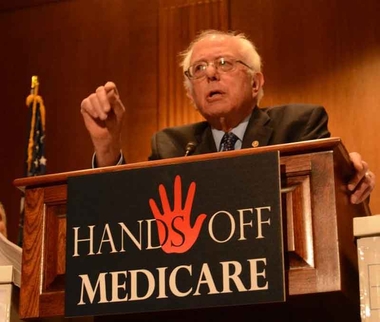What Bernie Sanders' fundraising bonanza tells about his chances

Bernie Sanders served notice to the rest of the 2020 presidential field when his campaign announced that he raised $5.9 million in its first 24 hours of existence. That's million of dollars more than he raised in the first 24 hours of his 2016 bid and millions more than any of his Democratic competitors have so far announced.
But what does Sanders' impressive haul signal for his chances of winning the nomination? It's a good thing: primary winners do tend to lead in early fundraising. That said, history suggests that fundraising doesn't tell us much in forecasting primary winners once we account for early polling.
Put simply: when fundraising tells one story and early polling tells another about who is most likely to win the nomination, early polling is more likely to be predictive.
I went back and looked at every open nomination process since 1980 to look at how well primary winners raised money in the early going. Specifically, I examined whether or not they led in fundraising during the half or full quarter after they registered their candidacy with the FEC. (Note: we're using quarterly FEC reports because most candidates have historically not publicized first day fundraising. Also, I excluded 1992 because eventual nominee Bill Clinton didn't register with the FEC until the second half of 1991 of the 1992 cycle, and I wanted to know how much explanatory power early fundraising truly has.)
The majority of candidates who won their parties nomination led the field in early fundraising. This includes Walter Mondale in 1984, George H.W. Bush in 1988, Michael Dukakis in 1988, Bob Dole in 1996, George W. Bush in 2000, Al Gore in 2000, Mitt Romney in 2012 and Hillary Clinton in 2016. A number of them did not, however: Ronald Reagan in 1980, John Kerry in 2004, John McCain in 2008, Barack Obama in 2008 and Donald Trump in 2016.
This 62% success rate of early fundraising forecasting the winner is nothing to sneeze at. Most people who run for president don't win their party's nominations, so something that is associated with winning a majority of the time is notable.
Sometimes even when a candidate doesn't lead in early fundraising their early fundraising prowess foretells future success. For example, when Obama barely trailed Clinton in early 2007 fundraising, it was one of the first clear signs that he would be a serious challenger to her.
It could be the case that Sanders is another Obama in this way: his strong fundraising numbers are telling us he is a more serious competitor than conventional wisdom holds.
Early fundraising, though, usually isn't some magic bullet for telling us something more than the early polls do. While most Americans are not tuned into the 2020 contest, voters in the first primary state of New Hampshire are receiving a lot of visits from the different Democratic candidates. In other words, New Hampshirites have good reason to pay close attention to the race for president in ways others don't. They know Sanders particularly well because he is from next door Vermont and won the state's primary in 2016.
And yet, Sanders has trailed in most early primary polling from the Granite State. The average New Hampshire poll has him in second place to Biden just like the national polls do.
The fact that Sanders doesn't lead in New Hampshire should be worrisome to him given how well early New Hampshire polling traditionally does at predicting future nominees. All but three nominees (Dukakis in 1988, Obama in 2008 and Trump in 2016) led at the moment when they first filed their candidacy with the FEC. All but Obama led in the New Hampshire polls at the time they filed their first half or full quarter fundraising with the FEC.
Obviously, the past isn't always predictive. We're dealing with a relatively small sample size here, and not many primaries have as many candidates running as 2020 will.
Still, when you put early fundraising and early New Hampshire polling into a statistical regression of all the candidates (not just nominees), early fundraising historically hasn't on average given us any additional predictive ability compared to the early New Hampshire polling. That shouldn't be too surprising because there have been a number of people who have been really good fundraisers but went nowhere in the actual primaries.
For every Obama for whom early fundraising suggested the polling was missing something, there are folks such as Phil Crane in 1980, Pat Robertson in 1988 and Phil Gramm in 1996. Most of you probably don't remember their presidential runs because they all finished with less than 10% of the national primary vote, although they raked in the early dough.
Of course if Sanders is able to continue his strong fundraising through the end of this FEC quarter (i.e. through March) and has a lead in the polls come April, it will be a real sign of strength. Additionally, it will be interesting to see where the polls end up if Biden decides not run. We'll get a better understanding of how resistant some Democrats are to Sanders' candidacy. A clear Sanders lead without Biden in the race would again be suggestive of a stronger Sanders' bid that conventional wisdom generally holds.
Analysis by Harry Enten, CNN. The-CNN-Wire™ & © 2019 Cable News Network, Inc., a Time Warner Company. All rights reserved.
The Gayly – February 21, 2019 ! 4 p.m. CST.





